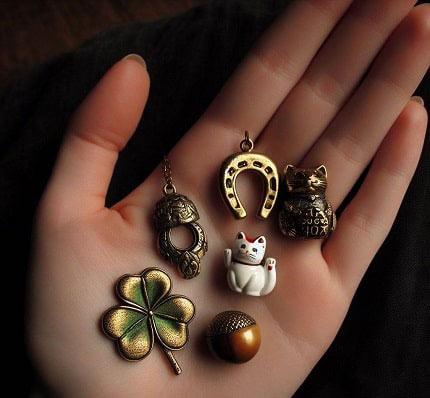The Psychology of Luck: How Your Mind Tricks You into Feeling Lucky
Picture this: you’re at a carnival, and you’ve just been handed a game token. The token has your initials carved into it by the game master. Suddenly, this token feels special, almost as if it’s destined to bring you good luck. It turns out, our minds are wired to feel luckier when something feels personalized or connected to us, even if the odds haven’t actually changed. Now think about how often we feel lucky simply because we believe a situation could have been worse. Maybe you missed your flight, but it could have been a crash. But does feeling lucky actually mean we are lucky? With this article delight on The Psychology of Luck let’s explore how these subtle psychological tricks influence our sense of luck and the surprising ways they shape our decisions.
The Psychology of Luck: The Research
Drs. Joe Goodman and Julie Irwin conducted a fascinating study that sheds light on how our perceptions of luck can be influenced by seemingly small details. In their research, participants were given lottery numbers in one of two ways: either randomly assigned by the researchers or personalized based on the participant’s name using numerology. The results were striking. Participants who received their numbers through the personalized method, , were willing to gamble more money on their lottery tickets. This suggests that when people feel a personal connection to something, even if it’s based on something as arbitrary as numerology, they perceive it as luckier.
From a psychological perspective, the study by Goodman and Irwin suggests that luck is not just a random event; it’s a feeling that can be manipulated. For those interested in the psychology of decision-making, this research opens up intriguing avenues for exploration. It suggests that by altering the way information is presented, it’s possible to influence not just how lucky people feel, but also how they act on those feelings. This could be particularly relevant in fields like marketing, where creating a sense of personal connection to a product or service might lead consumers to take actions they wouldn’t otherwise consider.
Downward and Upward counterfactuals in Luck
Downward counterfactuals
When we think about how a situation could have been worse, downward counterfactuals occur.
Examples;
Situation: Your house had a small kitchen fire, but it was extinguished quickly.
Downward Counterfactual: “I’m lucky it was just a small fire and didn’t spread to the rest of the house.”
Situation: You lost a tennis match but played well and avoided injury.
Downward Counterfactual: “At least I played my best and didn’t get injured during the match.”
Situation: You missed your flight but managed to book the next one.
Downward Counterfactual: “At least I didn’t miss my connection entirely and get stuck overnight.
This perspective can boost your sense of luck because it shifts your attention from what went wrong to what didn’t go wrong, making you feel fortunate and grateful for the less severe outcome. This mental framing helps us feel better about our circumstances and often leads to a more positive emotional state, even in less-than-ideal situations.
Upward counterfactuals
Upward counterfactuals, on the other hand, involve imagining how things could have gone better.
Examples;
Situation: You invested in stocks, and they grew, but not as much as you hoped.
Upward Counterfactual: “If I had invested in that other stock, I could have made a lot more money.
Situation: You had a job interview but didn’t get the position.
Upward Counterfactual: “If I had answered that one question better, I might have gotten the job.
Situation: You bought a car, but a better deal came up right after.
Upward Counterfactual: “If only I had waited a little longer, I could have saved more money.
This perspective can lead to feelings of dissatisfaction because it emphasizes what was lost. Or, what could have been achieved rather than appreciating the current outcome. By comparing your actual situation to an idealized version of how it could have been better, upward counterfactuals can diminish your sense of luck and leave you feeling less fortunate.
The Paradox of Feeling Lucky
Just because you believe you’re lucky doesn’t guarantee that good things will happen to you. For instance, a gambler who feels lucky may end up gambling more, driven by the belief that luck is on their side. This can lead to risky behavior and potential losses. Moreover, feeling lucky can have unintended consequences on how you treat others. Research indicates that people who perceive themselves as luckier are more likely to engage in antisocial behavior, believing they can evade the consequences of their actions. This mindset can lead to a greater willingness to commit misdeeds, assuming they are less likely to face punishment.
Final takeaway | The Psychology of Luck
As we’ve explored, our perceptions of luck are more complex than they might first appear. Also the way we think about outcomes; whether we focus on how things could have been worse (downward counterfactuals) or how they could have been better (upward counterfactuals) profoundly affect our sense of luck and our behavior. While feeling lucky might boost our confidence and optimism, we must recognize that this perception doesn’t always align with reality. It can lead us to take greater risks or even behave in ways that affect others negatively. So next time you feel fortunate or unlucky, take a moment to reflect on The Psychology of Luck. And, how these thoughts are shaping your actions and interactions. After all, a clear-eyed view of luck can lead to more mindful choices and a more grounded sense of well-being.
Further study : https://www.researchgate.net/publication/4838420_Special_random_numbers_Beyond_the_illusion_of_control
Read also : https://thebrightdelights.com/the-sagan-standard-why-extraordinary-claims-need-extraordinary-evidence/
